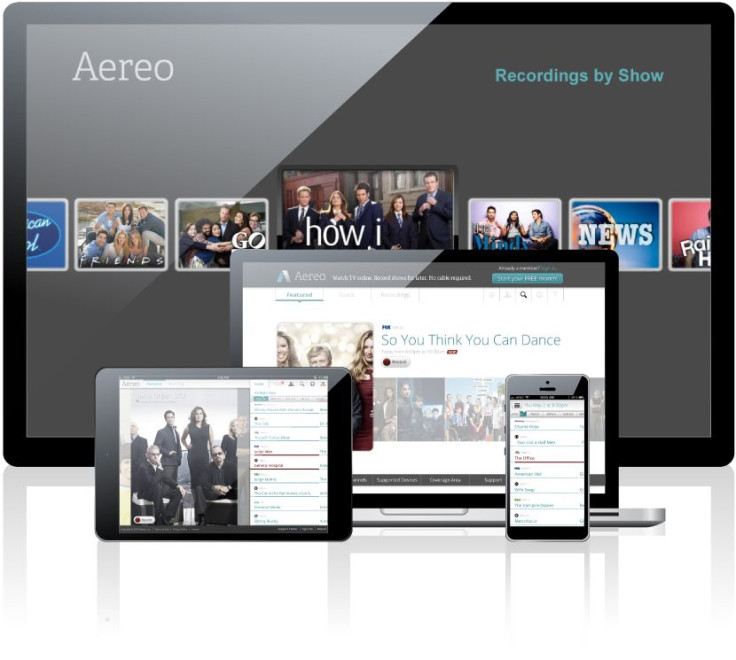Supreme Court Rules Aereo TV Streaming Service Illegal In 6-3 Decision

The U.S. Supreme Court has ruled 6-3 that Aereo, the television streaming service, is illegal on the grounds that it violates the copyright of U.S. broadcasters by capturing their over-the-air signal and “rebroadcasting” it for a fee.
Wednesday’s ruling marked the culmination of a two-year legal tussle between major U.S. broadcasters and Aereo, which rents small antennas out to customers that make it possible to stream a signal on their computer, smartphone or other devices such as a Roku or Apple TV. Aereo has argued that, because it assigns thousands of tiny aerials to customers, it is simply renting antennas, not infringing on any content.
Read the complete Supreme Court ruling here.
The company, which charged customers between $8 and $20 a month for a service that also included a cloud-based digital recorder, made it possible for customers to consumer cable content while paying a fraction of the bill. Aereo did not pay royalty fees to media conglomerates whose signals it redistributes.
A number of major broadcasters had warned that they would pull their stations off the air and begin a subscription-only service if Aereo was deemed legal, with the National Football League and Major League Baseball among the leagues that threatened to jump from the broadcast networks to cable channels.
Justice Stephen Breyer wrote the opinion for the court, explaining that the justices examined if Aereo’s service constituted a performance and, if so, was that performance public? The majority answered yes to both while noting that the startup presented an “overwhelming likeness” to the small cable companies that were targeted by amendments to the Copyright Act in 1976.
“The subscribers to whom Aereo transmits television programs constitute ‘the public.’ Aereo communicates the same contemporaneously perceptible images and sounds to a large number of people who are unrelated and unknown to each other,” Breyer wrote. “This matters because, although the Act does not define ‘the public,’ it specifies that an entity performs publicly when it performs at ‘any place where a substantial number of persons outside of a normal circle of a family and its social acquaintances gathered.’ Ibid. the Act thereby suggests that ‘the public’ consists of a large group of people outside of a family and friends.”
Aereo launched out of New York City in 2012 and has since spread to a number of major U.S. cities. Lower courts have issued contradictory rulings on the matter, but Aereo attorneys have maintained that the service was designed to avoid the perception that it constituted a public performance.
When a customer selected a show or movie to watch, Aereo assigned a single, penny-sized antenna to the customer’s chosen station. That signal was then sent to a video recorder that broadcast a stream of that program to the customer.
“Today’s decision is a victory for consumers,” said Paul Clement, the attorney representing the broadcasters. “The court has sent a clear message that it will uphold the letter and spirit of the law just as Congress intended.”
The Obama administration lent its support to the broadcasters but advised that if the service was found to be illegal, the court “should not call into question the legitimacy of businesses that use the Internet to provide new ways for consumers to store, hear and view their own lawfully acquired copies of copyrighted works.”
Justice Antonin Scalia penned the dissent and was joined in his opinion by Justices Clarence Thomas and Samuel Alito.
“A comparison between copy shops and video-on-demand services illustrates the point,” Scalia wrote. “A copy shop rents out photocopiers on a per-use basis. One customer might copy his 10-year-old’s drawings – a perfectly lawful thing to do – while another might duplicate a famous artist’s copyrighted photographs – a use clearly prohibited… Either way, the customer chooses the content and activates the copying function; the photocopier does nothing except in response to the customer’s commands. Because the shop plays no role in selecting the content, it cannot be held directly liable when a customer makes an infringing copy.”
Aereo CEO and founder Chet Kanojia said in a statement that the court’s decision is “a massive setback [for] the American consumer.”
“We’ve said all along that we worked diligently to create a technology that complies with the law, but today’s decision clearly states that how the technology works does not matter. This sends a chilling message to the technology industry,” Kanojia said.
“We are disappointed in the outcome, but our work is not done. We will continue to fight for our consumers and fight to create innovate technologies that have a meaningful and positive impact on our world.”
© Copyright IBTimes 2025. All rights reserved.





















